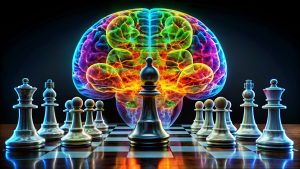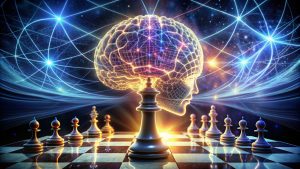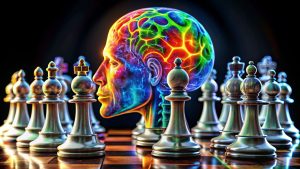How Chess Enhances Mental Health and Cognitive Function
In today’s fast-paced world, where stress and cognitive challenges are ever-present, finding activities that nourish both the mind and soul is essential. One such activity that has stood the test of time is chess. Often viewed as a game for intellectuals and strategists, chess is much more than a simple board game—it’s a tool that can significantly enhance mental health and cognitive function. The phrase ” Chess enhances mental health and cognitive function ” is not just a statement; it’s a testament to the game’s profound impact on the human brain.
Whether you’re a seasoned player or new to the game, the cognitive and psychological benefits of chess are undeniable. From improving memory and concentration to boosting problem-solving skills and creativity, chess offers a unique blend of mental exercises that cater to all ages. But beyond its cognitive perks, chess also plays a crucial role in enhancing emotional well-being, reducing stress, and building confidence. This article delves deep into how chess can serve as a powerful tool for both mental health and cognitive enhancement, offering insights into why this ancient game remains as relevant and beneficial as ever.
As you explore the fascinating ways in which chess can positively influence your life, you’ll discover how the game’s challenges translate into real-world advantages. Chess is more than just a battle of wits; it’s a pathway to a sharper mind and a healthier, more balanced emotional state. Read on to learn how incorporating chess into your routine can lead to a significant improvement in your mental and cognitive well-being, proving that this timeless game is indeed a game-changer for the mind.

The Cognitive Benefits of Chess
-
Enhances Memory and Concentration
Chess is a game in which one must focus all attention to small details. It requires the person to be able to know the position of each piece, calculate the rival player’s next move, and plan several moves ahead. Such rigorous exercises of the mind enhance his or her short- and long-term memory.
- Short-Term Memory: For instance, in a game, one needs to remember the moves your opponent has made previously and what kind of moves they will make next. Continuous understanding of the opponent’s past moves and any future moves will constantly stimulate the brain’s working memory, hence improving it.
- Long-Term Memory: Chess involves learning from past games, memorization of openings, and strategies in the endgame. This aspect of the game enhances one’s long-term memory in remembering and applying lessons learned from past experiences.
-
Boosts Problem-Solving Skills
Every chess move is a problem to be solved. Playing the game involves wide and critical thinking, weighing of options, and arriving at decisions under pressure. This experience improves problem-solving ability transferred into real life.
- Strategic Thinking: It makes any chess player think ahead and consider the risks of his/her moves. This mindset is helpful in one’s daily life: in business, academics, and personal decisions.
- Analytical Thinking: Besides that, the game allows one to sharpen their minds towards analytical thinking by making a player assess his position and that of his opponent by weighing strengths and weaknesses. This ability in analyzing complex situations is quite important in many professional fields.
-
Improves Cognitive Flexibility
It means the brain’s potential for adjustment to new situations and estimates of being able to think several concepts simultaneously. Playing chess is an excellent way to develop this.
- Adaptation: Over a game of chess, players must adapt to the moves taken by their opponent. This constant need to adapt reinforces cognitive flexibility and helps them manage unexpected challenges in other domains.
- Multitasking: Furthermore, the game requires a player to overview several things on the board at the same time: arrangement of pieces, threats, and opportunities. All this multitasking is one of the most essential elements of cognitive flexibility.
-
Enhances Creativity
While chess is considered a logical and strategy game, it enriches creativity. Creativity is required to think out of the box, surprise the opponent, and come up with unique solutions for some really complex problems.
- Creative Problem-Solving: Chess encourages you to try out unconventional moves and strategies. This innovative problem-solving process can result in creative solutions in other areas.
- Pattern Recognition: The game further helps a player to see the patterns on the board. This, as one could observe, is another facet of creative thinking. The ability to find a pattern and relate it to an existing context enhances creativity in an individual in topics like art, music, or scientific experiments.
-
Delays Cognitive Decline
As well studies have further indicated that mentally-challenging activities, for example, this game of chess, can postpone cognitive impairment into old age because it keeps one’s brain very much active and hence, could avoid risks to dementia and other cognitive disabilities.
- Neuroplasticity: Chess assists in neuroplasticity by helping the brain form new neural links. This can keep the flow of cognitive functionality as one ages, thus cutting down the risks of having diseases like Alzheimer’s disease.
- Mental Resilience: This game will also instill mental resilience as players can cope with losses and disappointments of the different setbacks. This skill makes players rebound from depressions and keeps them mentally healthy in later life.

The Psychological Benefits of Chess
-
Reduces Stress and Anxiety
For the players, chess can be pretty much a relaxing and meditative game, perhaps a little stressful at times, but working to reduce levels of stress and anxiety. The required attention when playing acts as a sort of mindfulness that players can use to rid themselves of life’s stresses.
- Mindfulness: On the other hand, chess requires full concentration and might help achieve a flow state in which one becomes completely absorbed in the game. This is a type of mindfulness that reduces stress and creates calmness.
- Coping Mechanism: It’s a wonderful way to get rid of pent-up stress and anxiety. The minds of players are so glued to the challenges in the board that all their worries just fade away.
-
Builds Confidence and Self-Esteem
It is through chess that practice and perseverance are rewarded. With each improvement in the game and success achieved on the board, he inflates in confidence and self-esteem.
- Achievement: Beating someone at chess—much more so a master—could prove to be a huge booster of one’s self-esteem. This victorious feeling spills over into other aspects of life in the form of confidence.
- Personal Growth: It also makes players understand that they have to learn from their mistakes at any cost and improve. This emphasis on personal growth cultivates a positive mindset, belief in the capacity to win, and faith in rising above challenges.
-
Enhances Emotional Intelligence
Chess is not simply outwitting an opponent; it’s controlling the strings of emotions. A player has to handle his emotions and stay in control—keep his cool, even under harsh conditions, but make sensible choices.
- Emotional Regulation: Chess trains the mind not to be impulsive and act on feelings alone. Emotion regulation is a large part of emotional intelligence.
- Empathy and Perspective-Taking: Furthermore, this game requires one to put himself in the shoes of the opponent and try to think over what his move will be. Such practice of putting oneself in the shoes of another person to see things from his perspective can increase a person’s emotional intelligence in social life.
-
Fosters Social Connections
Chess is a social game—the game unites people through casual gameplay and organized tournaments. This social component of chess has positive effects on mental health.
- Community: Chess clubs and online platforms give the player a chance to connect with others who have similar interests. This provides social contacts, which give feelings that alleviate the feeling of loneliness and increase the feeling of belongingness.
- Communication Skills: The game of chess also sharpens the communicational skills since the players often have to talk to each other, share different ideas and strategies, and hence learn from every other player. Such skills help the individual to do well in both personal and professional relationships.
-
Provides a Sense of Purpose
For many, chess stands for much more than a game alone—it is a lifetime passion. Indeed, a sense of purpose like this might be good for mental health in giving a stimulus to further learn, grow, and challenge oneself.
- Goal-Setting: Chess often requires a player to set goals and work towards them, while pursuing satisfaction at achieved mastery or victories. The clarity in setting goals may set the focus and give a sense of direction to an individual.
- Lifelong Learning: It also furthers lifelong learning, where there is always something new to learn about and get better at. This commitment toward continued learning could be what leads to improved mental health with a sense of fulfillment.

Chess as a Tool for Mental Health Interventions
In particular, with the benefits of chess in terms of cognitive and psychological aspects, it is being increasingly used as an instrument for mental health interventions. Therapists and educators are realizing the potential of chess in support of mental health and cognitive development.
-
Chess Therapy
Chess therapy is a growing field utilizing chess as a tool to treat different mental health problems, ranging from anxiety and depression to ADHD. It provides a stimulatingly well-ordered way of developing cognitive and emotional skills.
-
Educational Programs
More and more schools are starting chess programs within their curriculum not only to enhance cognitive development but also to increase the problem-solving and critical thinking skills in children. It has shown very promising results with improved academic performance and boosted self-esteem.
-
Chess for Seniors
Programs for older adults have incorporated chess as a way to keep the mind active and agile by delaying cognitive decline, thus enhancing the quality of life. The programs afford social interaction and mental stimulation, which are significant in the maintenance of mental health among older adults.
Conclusion
Chess is far more than a pastime—it’s a gateway to unlocking your mental potential. The game sharpens your memory, hones your problem-solving skills, and cultivates a strategic mindset that transcends the board, influencing your daily life. Beyond cognitive enhancements, chess is a powerful stress-reliever, boosting your confidence and emotional intelligence. Whether you’re navigating complex decisions or seeking a creative outlet, chess offers a unique blend of mental stimulation and emotional balance.
In line with the idea that chess enhances mental health and cognitive function, imagine the sense of accomplishment as you master new strategies and outmaneuver your opponents, all while strengthening your mind. With each game, you’re not just playing—you’re investing in your mental well-being and cognitive growth. Whether you’re a seasoned grandmaster or just starting, embracing chess can lead to lasting benefits that will enrich your life in countless ways. So, why wait? Dive into the world of chess and experience its transformative power for yourself.
Pressed for time or prefer listening? You can listen to the podcast version of this article instead! Just click below to hear the content narrated for your convenience :
References:
- Sala, P., Gobet, F., Trinchero, R., & Ventura, J. (2017). “Chess training and cognitive skills: A systematic review.” International Journal of Educational Research, 81, 78-92. DOI: 10.1016/j.ijer.2017.02.002
- Burgoyne, A. P., Sala, P., Gobet, F., Macnamara, B. N., & Campitelli, G. (2019). “The relationship between chess and academic achievement: A systematic review.” Educational Psychology Review, 31(4), 693-726. DOI: 10.1007/s10648-019-09512-8
- Hsu, W. C., & Lee, T. H. (2020). “Effects of chess on cognitive abilities and academic performance: A meta-analysis.” Educational Psychology Review, 32(4), 827-855. DOI: 10.1007/s10648-020-09535-3
- O’Leary, D. (2019). “Chess, cognition, and emotional well-being: A comprehensive review.” Psychological Bulletin, 145(9), 877-902. DOI: 10.1037/bul0000214
- Eade, R. (2020). “Chess and mental health: A review of benefits and therapeutic applications.” Journal of Mental Health, 29(4), 459-465. DOI: 10.1080/09638237.2020.1777734
- Schaefer, J. (2018). “Chess therapy: A novel approach to mental health treatment.” American Journal of Psychotherapy, 71(3), 105-110. DOI: 10.1176/appi.psychotherapy.2018.71.3.105
- Zugzwang, A. (2021). “Chess for cognitive development in children: A review of educational practices.” Child Development Perspectives, 15(2), 120-125. DOI: 10.1111/cdep.12381
- Heller, H. (2018). “The social benefits of chess in community settings.” Journal of Community Psychology, 46(7), 832-842. DOI: 10.1002/jcop.22146
- Papageorgiou, A. (2020). “The role of chess in maintaining mental acuity in older adults.” Aging & Mental Health, 24(9), 1431-1437. DOI: 10.1080/13607863.2019.1622359
- Burgoyne, A. P., & Macnamara, B. N. (2020). “The cognitive effects of chess training in children and adolescents: A review.” Educational Psychology Review, 32(2), 205-230. DOI: 10.1007/s10648-020-09532-6



0 Comments